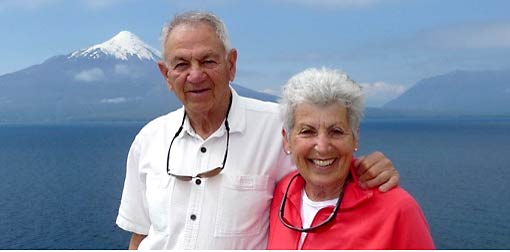- Meet Our Leaders
When Zoe Schwartz first learned about JFCS she knew she had found the right place to devote her time and energy. Zoe has served as a JFCS Board Member for five years; she is part of JFCS’ Sonoma County Leadership Team, the Palliative Care Taskforce, and the Public Issues Committee. Her passion and enthusiasm for JFCS never waivers and she says, “JFCS is the preeminent human services organization in the Bay Area. I talk about the programs and the people it serves A LOT!”

Zoe Schwartz with her husband Stephen.
Have you always been involved in the Jewish Community?
I’m not affiliated with a synagogue nor have I participated in Jewish organizations outside of JFCS. My husband and I consider ourselves cultural Jews, passing on traditions and celebrating holidays with our family and trying our best to lead good, ethical lives. The work that JFCS does aligns with our own values.
I would say that my upbringing was atypical. My mother passed away when I was very young and I was raised by my father and my grandmother in Chicago. Although my grandmother spoke only Yiddish and had a small network of friends from the old country, most of my friends and community were not Jewish and I did not have a formal Jewish education when I was growing up.
What sparked your interest in exploring your heritage?
My parents passed on a love of tennis and I grew up loving the sport too. I played competitively since I was 12 and became a ranked player. In 1997, I was chosen to represent the U.S. as a member of the senior team in the Maccabiah Games (the Jewish Olympics) in Israel.
Competing with Jewish athletes from around the world in this way was a remarkable experience. My travels in Israel in conjunction with the Games gave me a unique exposure to and appreciation of Israel and the resilience of the Israeli people.
How did you get involved in philanthropy?
It just happened. There was no philanthropic model in my early upbringing, but as an adult I have always believed that helping those less fortunate is the right thing to do. I have tried to incorporate this belief to extend not only to human services, such as those so successfully provided by JFCS, but to other causes that are important to me, including: empowering women and teens to reach their potential, protecting the environment and the planet as we know it for future generations, and supporting Oasis of Peace (NeveShalom / Wahat al-Salam), a village jointly established by Jewish and Palestinian Arab citizens in Israel. I believe it’s an amazing incubator for peaceful co-existence.
Tell us about your family.
My husband Stephen and I have been married for 48 years. We have three daughters and two grandchildren. Our daughters live in the Bay Area and having them and their families close-by is wonderful.
Stephen was an attorney and I was teacher and paralegal for many years. We eventually founded an import business which we managed together for many years. Now we own a small organic vineyard.
What are the most rewarding parts of your involvement with JFCS?
I’m currently a member of JFCS’ Palliative Care Taskforce which is studying palliative care as a whole and how we may expand and improve our program. My passion for palliative care comes from personal experience with my father who suffered during his treatment for stomach ulcers and leukemia. If there had been a palliative care program for him, it would have meant so much to me and my family.
JFCS is a leader in this area and is one of the few social service agencies in the country providing this important service. Many people think that palliative care is the same as hospice care and just for those at the end-of-life. Not so! It includes medical case management, spiritual support, volunteer visits, and more.
What we are learning by studying the outcomes of palliative care is that when a patient with a serious chronic illness begins this program early on, it reduces the frequency of emergency room visits, shortens hospitalizations and greatly improves, enriches, and can lengthen their lives. I see this as a win-win—less cost and better quality of life—and I am committed to doing what I can to help our palliative care program thrive.
I also give a voice to the people we serve as a member of JFCS’ Public Issues Committee. We meet with local and California state legislators in Sacramento to educate them about JFCS‘ programs and promote our position regarding impending legislation.
What would you say to someone wanting to learn more about JFCS?
I would say that at some point in your life there is a time that you, a family member, or an acquaintance may need a helping hand. Whether it’s a child with behavioral, learning, or physical disabilities, an adult fallen on hard times, or a senior needing assistance with home care, JFCS is there for all. JFCS helps the underserved who do not have financial resources as well as those that can afford to pay—providing professional and compassionate care for everyone. Having said that, I would then recommend they visit our website to gain a better understanding of the scope of our services.
Anything else you’d like to add?
It’s an honor and privilege to serve JFCS.
